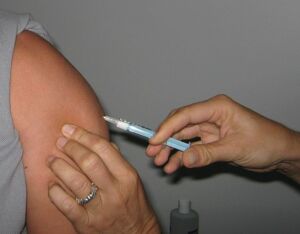News
Refugees carrying dangerous diseases into Denmark
This article is more than 9 years old.
Doctors discovering the likes of diphtheria, tuberculosis and malaria

Some are calling for all immigrants to be vaccinated (photo: Grook Da Oger)
Diphtheria, an infectious respiratory disease that hasn’t been seen in the country for 18 years, has been carried into Denmark by two Libyan refugees.
Although it is recommended that countries screen refugees for diseases, Denmark does not.
“We have found two cases of diphtheria among Libyan refugees,” Kurt Fuursted from Statens Serum Institut told Metroxpress.
“The disease can be dangerous if you are not vaccinated against it. This strain is very rare and was last seen in Denmark in 1998.”
Tuberculosis and malaria has also been discovered among asylum-seekers in Denmark.
Risk of infection
In Italy, 27 refugees were discovered to have Lyme disease, and there are concerns that a swine flu outbreak that has killed 117 people in Iran and Turkey will come to Denmark via the refugees.
The European agency against contagion issued a warning before Christmas concerning the threat of diseases being carried over by refugees. It recommended that all countries screen the refugees for infectious diseases. Norway, Germany and the Netherlands are screening new arrivals, but Denmark has yet to get onboard.
“There is no doubt that refugees are arriving with infectious disease that we are not accustomed to,” said Fuursted. “We have discussed whether or not to screen all refugees for infectious diseases.”
Examining the problem
A study group – including representatives from asylum centres and the national board of heath, Sundhedsstyrelsen – was launched by the Immigration Service last week.
“Sundhedsstyrelsen is monitoring the situation to assess whether it is necessary to take further measures to prevent the spread of infectious diseases,” said Sophie Løhde, the health minister.
Refugees also at risk
There is also the risk that asylum-seekers could fall victim to a disease in Denmark they have not encountered before.
Some 20,000 refugees who came to Denmark in 2015 had not been vaccinated against the diseases they risk getting in Denmark.
The World Health Organisation (WHO) recommends vaccinating all immigrants against measles and meningococcal – protection that Danes receive as children.
Measles alone costs 150,000 lives worldwide each year.
“Our position is clear,” said Robb Buttler, WHO’s vaccine program head. “Migrants and asylum-seekers should be examined and vaccinated against the diseases they are not protected against.”
READ MORE: Refugees and asylum seekers should be screened for tuberculosis, says doctor
Buttler said diseases like measles are making a comeback in Europe.
Sundhedsstyrelsen and the Red Cross said that only children under the age of 18 are currently being vaccinated.






































